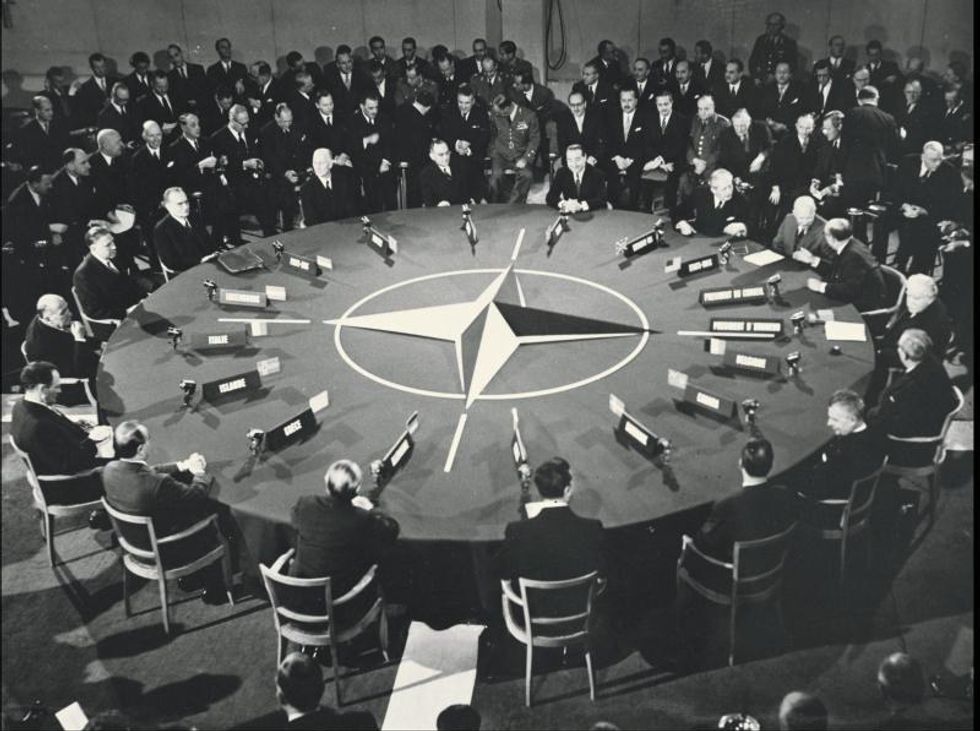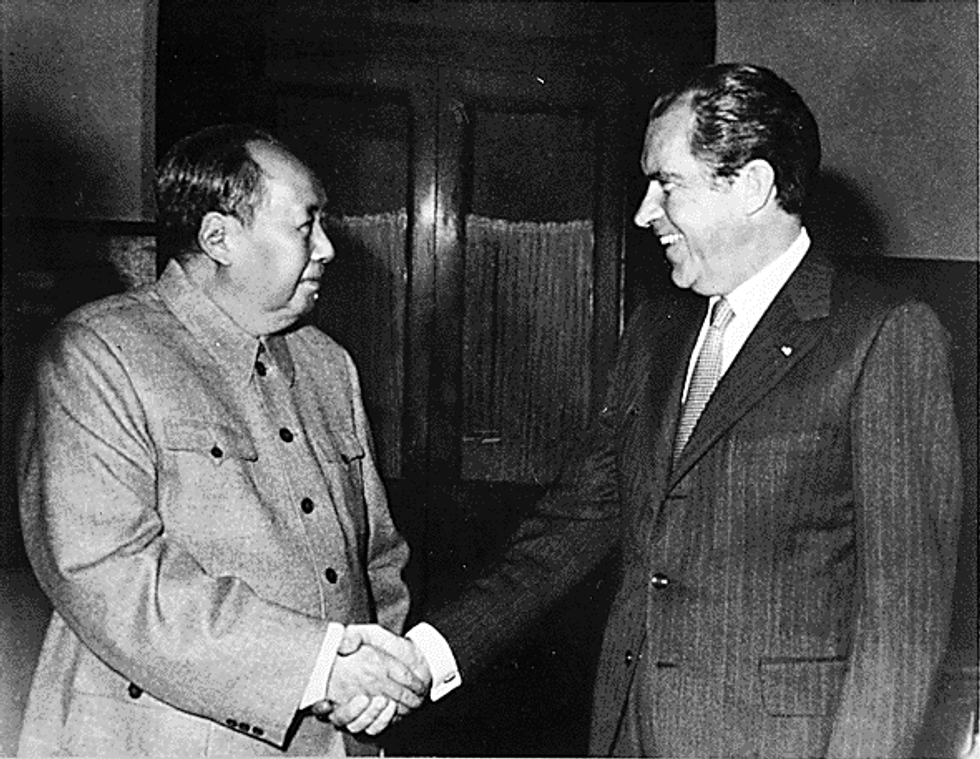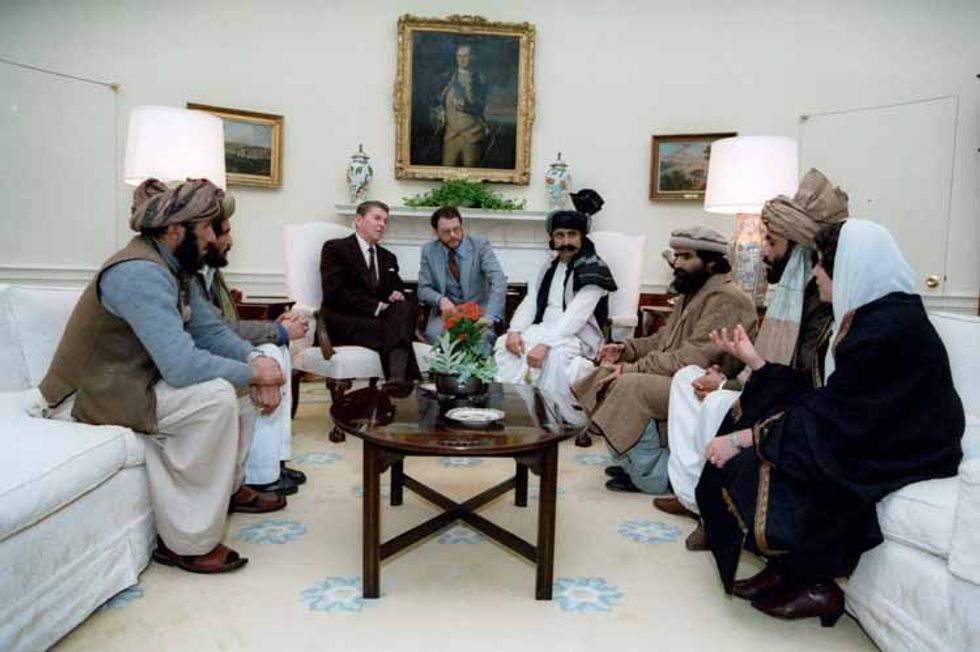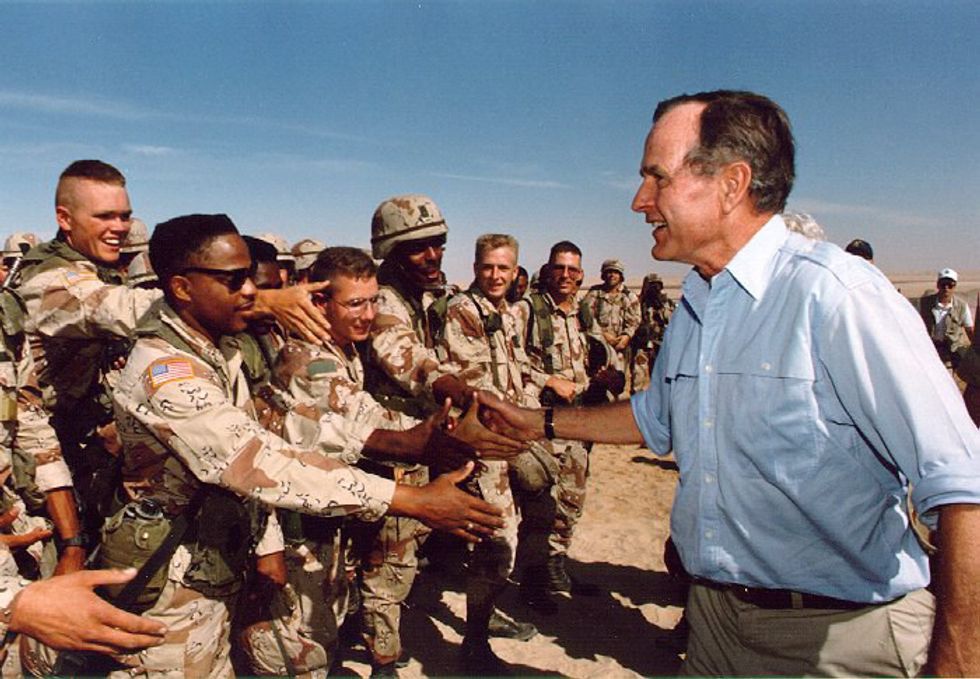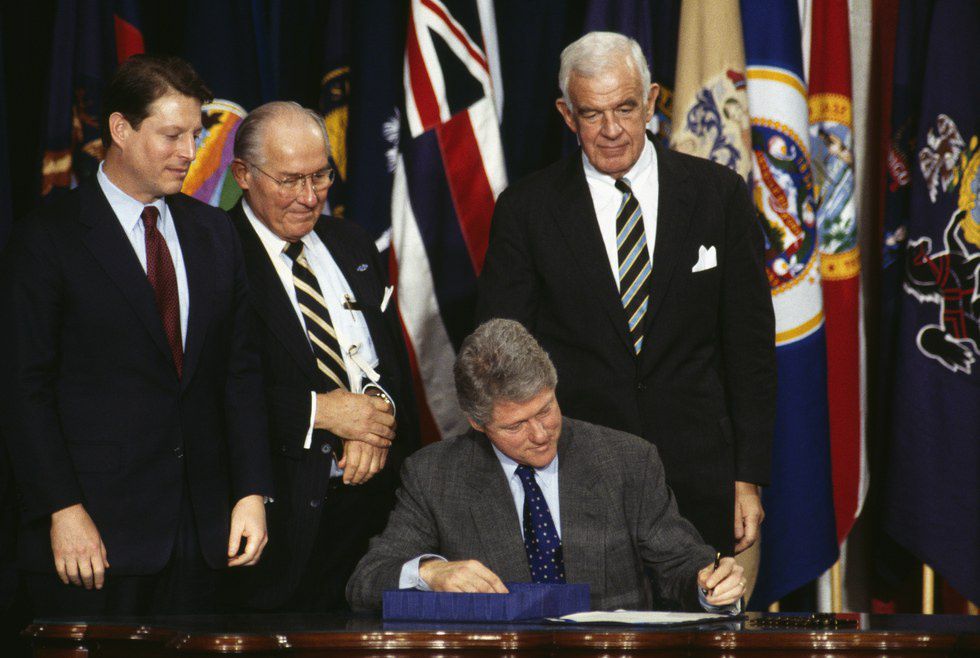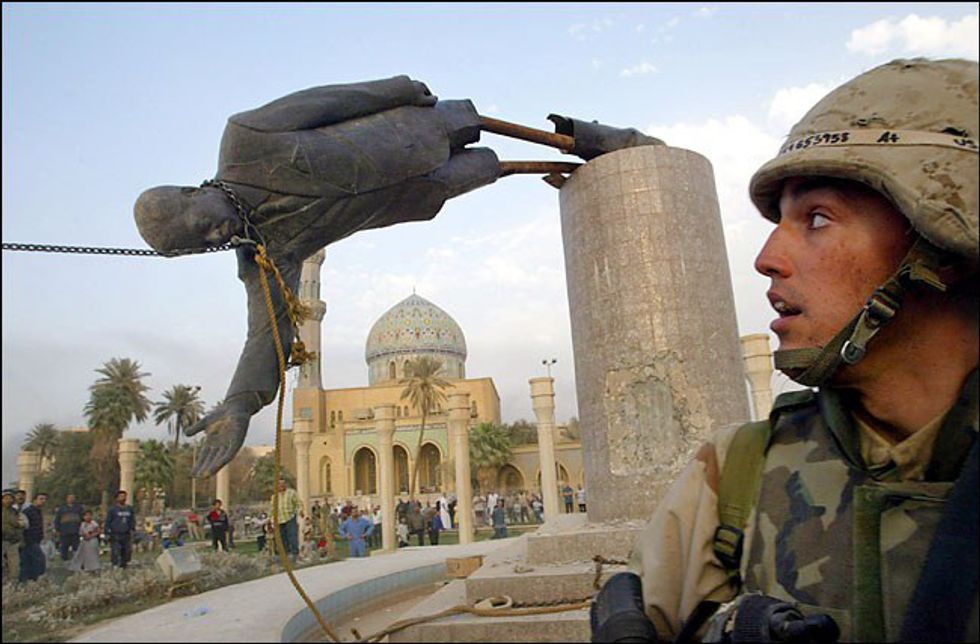The problems America faces today both on the domestic and international front did not randomly appear. The present is shaped by events in the past and America is no different. Decisions made and policies pushed decades ago can still have a lasting effect on the country and world we live in today. When examining the problems that America faces, it is imperative to look back at our history to understand the causes. Since the close of World War II, the world has drastically changed. Empires have risen and fallen, new ideas have been embraced, and older ideas abandoned. As World War II has shaped the world we live in today, so have the events since its conclusion. The end of World War II saw America take on a new leadership role in the world and America’s decisions abroad have heavily influenced the post-WWII world. Every decision America makes will either help or hurt us in the future, some decisions can be more easily traced as to how their implementation affects us today.
Creation of NATO
The creation of the North Atlantic Treaty Organization in 1949 cemented an unbreakable bond between Western nations. As America moved to expand its influence in the post-WWII world and counter Soviet dominance, allying with fellow liberal Western democracies became a necessity. Allies of the United States in European countries first developed the idea of an alliance to combat the influence of the Soviet Union, but knew that the United States would need to be included to be able to match the power of the USSR.
The United States aiding in the creation of NATO helped to connect America with countries that had similar goals and further national interest. Members of NATO agree to defend one another in the event that a member nation is attacked. As Communist countries retaliated with the creation of the Warsaw Pact, the world became further divided between supporters of the United States and supporters of the Soviet Union. Throughout the Cold War, NATO members worked together to combat the spread of communism with America as a major force within the organization.
Since the fall of communism throughout Europe, NATO has still maintained influence. It still unites countries with similar goals and allows for the United States to continue to maintain influence on the global stage. NATO countries are currently working together to combat the rise of terrorism and Russian aggression on Eastern European countries’ borders. Without involvement in NATO, the United States would not be able to maintain the influence it has today through aligning with nations sharing common interests.
Overthrow of Iranian Prime Minister Mohammad Mosaddegh
In 1951, popular politician Mohammad Mosaddegh was democratically elected as Prime Minister of Iran. Opinions of him were less than positive on the international front. Mosaddegh pushed for a reduction of foreign influence in the country. As Prime Minister, he began nationalizing the oil industry in Iran which had been under the control of Britain for decades. Angered, the UK sought help from the United States. After being in power for a little over two years, Prime Minister Mosaddegh was overthrown in a coup conducted by the CIA and Britain’s Secret Intelligence Service.
President Eisenhower’s approval of the CIA getting involved in overthrowing the democratically elected leader of Iran provided them with a new leader more friendly to Western nations. After the overthrow of Mosaddegh, the government of Iran became increasingly autocratic, oppressive, but friendly towards America. As the Shah of Iran continued close relations with the United States, Iranians began to develop a hatred for the United States and Western civilization. The fact that the United States helped to overthrow their popular leader and aligned with the current oppressive government helped to stoke anti-US sentiment throughout the country. The 1979 Iranian Revolution and overthrow of the Shah of Iran was in large part influenced by the blowback caused by the overthrow of Prime Minister Mosaddegh and the United States’ close relations with the Shah’s oppressive regime.
Since the 1979 Iranian Revolution, the Iranian government has maintained a strong anti-US sentiment. As crowds of Iranians chant “death to America,” the hatred for the United States stems from the overthrow of Mosaddegh and support for the Shah. Whether it was the Iranian hostage crisis or the numerous quarrels with the country since 1979, the United States and Iran have been consistently at odds. As America debates what future relations with Iran will entail, it is important to remember the reasons for their animosity against America.
Opening of Diplomatic and Economic Relations With China
Throughout the Chinese Civil War, America had consistently supported the Chinese nationalists against the Chinese Communists. Despite U.S. effort, the Communists won the civil war in 1949. The U.S. backed Nationalists fled to the island of Taiwan as the Communists cemented control of mainland China. Mao Zedong, the leader of the newly founded People’s Republic of China, moved quickly to establish close relations with the Soviet Union. As the People’s Republic began to develop its government, the United States was devastated by China falling to communism. Instead of recognizing Mao’s China, America instead recognized Taiwan as China, despite only occupying a small island. Taiwan sat on the UN Security Council as China and America only traded with Taiwan, all the while keeping mainland China isolated.
For years, there was no contact between the United States and Mao’s China. As relations fizzled between China and the Soviet Union (after the death of Stalin), the U.S. continued to isolate China on the world’s stage. Before being elected president, Richard Nixon had discussed improving relations with China. After being elected, Nixon and his National Security Advisor Henry Kissinger began working towards improved relations with Mao’s China, which wasn't even recognized as an official government. Pakistan, a U.S. ally and a nation with close ties to the People’s Republic of China, helped to intermediate talks between American and Chinese diplomats. Henry Kissinger secretly flew to China in 1971 and set the table for a visit by the president himself in the near future. In February of 1972, President Richard Nixon visited the People’s Republic of China breaking years of international precedent. President Nixon toured the nation that had been isolated from America for so long, met with members of the Chinese government, and met with Chairman Mao. Mao, who had been in power for decades and was ailing health wise, but still managed to talk briefly with the U.S. President. The normalization of relations with China and the United States was seemingly a win for both countries.
Nixon’s opening of China shifted America’s influence in Asia. He took advantage of the divisions between the Soviet Union and China in an attempt to get China on America’s side. The normalization of relations with China created more of an ally in the Cold War, despite disagreeing on many issues, it was a win for the United States. Since the end of the Cold War, relations with China have not become any less important. Despite disagreeing on many issues, China remains an ally of the United States, (albeit shaky at times). Additionally, China has also become a critical trading partner for the United States, perhaps the most important trading partners America has.
Arming of the Mujahideen
The Truman Doctrine, which stated that the United States would attempt to contain the spread of communism and support those who were fighting against communist forces, was still being practiced thirty years after President Truman had announced it. In a period of a few short years, Afghanistan had gone through different governments and leaders. As rebellions against the current government increased, the Soviet Union mobilized troops to get involved. The Soviet army invaded Afghanistan and installed a new leader of the country. The Mujahideen, an Islamic fundamentalist paramilitary organization, had begun recruiting and training before the Soviet Union invaded Afghanistan. Once the Soviets invaded, the Mujahideen began mobilizing military to fight the occupying army. The guerrilla Mujahideen forces attracted the attention of the United States, who wanted to help stop Afghanistan from remaining under communist control.
As the war between the Mujahideen and the Soviet Union dragged on, the United States began aiding the Mujahideen. The United States’ aide to the Islamic fundamentalists began between $20 and 30 million per year in 1980. By 1987, that number had skyrocketed to $630 million per year. With the support of the United States and other nations, the Mujahideen successfully had sucked the Soviet Union into what seemed like an unwinnable war. Some historians liken the Soviet Union’s war in Afghanistan to America’s war in Vietnam. The war had not only boosted membership of the Mujahideen, but many other Islamic fundamentalist groups poured into Afghanistan to help. A young Saudi Arabian named Osama Bin Laden created Maktab al-Khidamat, an organization to raise further funds to support the Mujahideen and other Islamic fundamentalist groups waging jihad in Afghanistan. With the Mujahideen and other Afghan Arabs United against the Soviets in their battle, the Soviet Union eventually withdrew from Afghanistan. As the Soviet Union withdrew from Afghanistan, so did United States support for the Mujahideen. Afghanistan soon fell into a civil war because of the vacuum left behind. After numerous battles between rivaling factions, former Mujahideen members formed a new group called the Taliban which eventually gained control of the nation.
Members of the Mujahideen, using arms and training received during the Soviet-Afghan War, later founded the Taliban and were able to take over the country. The Taliban created an oppressive Islamic fundamentalist government based on Shariah Law. Under the Taliban’s government, Afghanistan became a safe haven for Osama Bin Laden’s Al-Qaeda terrorist group. After the horrific September 11th attacks in 2001 perpetrated by Al-Qaeda, America invaded Afghanistan after the Taliban refused to give up Al-Qaeda terrorists. Just a little over two decades ago, the United States had begun funding the Mujahideen. Now they were going to war to overthrow many of the same people they had previously armed. Since the Taliban has been overthrown, it has continued to try and regain control of the country it once ruled. An armed group that once received hundreds of millions of dollars from the United States eventually became one of its number one enemies. The arming of the Mujahideen later ended up hurting the United States, while fighting former allies.
Operation Desert Storm
As communism and the Soviet Union fell throughout Europe in the late 1980s and early 1990s, the world order realigned once again, just as it had after World War II. The Cold War was over and the United States expanded its dominance. Without the “Evil Empire,” America had no competition on the world’s stage. While America witnessed the restructuring of the world order, it was interrupted by the invasion of Kuwait by Saddam Hussein’s Iraq.
Iraq’s invasion and annexation of Kuwait was universally condemned by the international community. Iraq was slapped with sanctions by America, the United Nations, and countries throughout the world, but continued to be defiant. The United Nations passed a resolution in November of 1990 calling on Iraq to withdraw from Kuwait by January 15, 1991. Fearing an invasion or attack on its major ally and oil benefactor Saudi Arabia, the United States began to build a coalition to free Kuwait from Iraqi occupation. The United States built a coalition of thirty four countries, the largest of any type since WWII, and and began Operation Desert Storm on January 17, 1991. The Iraqi army was no match for the collation and the Gulf War ended on February 28th. Iraq exited Kuwait and their government was restored. Despite his loss, Saddam Hussein retained power of Iraq. The United States led coalition was victorious.
As the Soviet Union crumbled, the United States faced its first leadership test. Leading a broad coalition to free an invaded sovereign nation, the United States had won its first test. Russia and China have both built up their power on the international scene since Operation Desert Storm, but it cemented the United States as a leader of the free world. Bringing together a coalition to combat international problems is a popular idea in today’s foreign policy climate. A prime example of a coalition achieving its objectives was exemplified in the Gulf War.
Signing of NAFTA
As the world entered the 1990s, economies across the globe began to become more intertwined through globalization. In America, there had been calls from both Democrats and Republicans for the United States to become more involved in the world economy. If America was to remain the global superpower that it was, it would have to join the rest of the world in trade. To meet the needs of a country headed towards the twenty first century, America would have to expand its influence economically. This would occur through numerous free trade deals, but NAFTA was the free trade deal that began America’s further involvement in the world economy.
The North Atlantic Free Trade Agreement’s negotiations began in 1990 under President George H.W. Bush. After numerous negotiations and debate, the respective heads of state signed a ceremonious agreement in 1992. The deal would have to be approved by the legislative or parliamentary branch of America, Canada, and Mexico. Fierce debate ensued as to whether or not the deal would cause job loss and if America would end up benefiting from NAFTA. President Bill Clinton signed into law NAFTA in 1993 and it went into effect on January 1, 1994. NAFTA is the world’s largest free trade barrier. The deal entailed the incremental reduction of tariffs between America, Mexico, and Canada. Eventually tariffs between the nations would be completely eliminated. NAFTA was the first in a series of numerous free trade deals that would be signed by America in the following decades.
To some, NAFTA opened a Pandora’s Box of job loss and globalization, while others view it as the first step in America becoming more fully ingrained in the world economy as a whole. Economists are still debating the effect on the economy and the decline in manufacturing jobs and their relations to the signing of NAFTA. The significance in the signing of NAFTA does not lie in the reduction of tariffs between the three nations, but in the fact that it began America’s integration into the world economy. NAFTA was only the first of many free trade deals that the United States has signed in the past twenty years. As opponents of NAFTA criticize some of the effects of the deal, they must also look at the trade deals that followed. NAFTA was only the beginning.
Iraq War
Perhaps no other decision in recent decades has defined and impacted America’s foreign policy more than the 2003 invasion of Iraq. Since Operation Desert Storm and the invasion of Kuwait, the U.S. and Iraq had not been on good terms. Iraq had continually violated United Nation resolutions and America viewed Saddam Hussein as a brutal dictator and tyrant. Iraq had used chemical weapons in its war against Iran in the 1980s and many feared he still possessed them. When Al-Qaeda attacked the United States on September 11, 2001 the world was left at a standstill. As America began preparing to go after the terrorists behind the horrific attack, another country received a threat; Iraq. In his January 29, 2002 State of the Union, President George W. Bush attacked an “Axis of Evil” that consisted of Iraq, Iran, and North Korea. These countries were accused of sponsoring terrorism, seeking weapons of mass destruction, and attempting to build nuclear weapons. Iraq denied having any involvement with Al-Qaeda or possessing weapons of mass destruction. As the United States prepared to invade Iraq and topple Hussein’s regime, Iraq allowed in UN inspectors for the first time in years. The Bush administration continued to discuss the threat Iraq posed to the American people even as the UN found no possession of WMDs in Iraq. Saddam Hussein insisted that they possessed no WMDs and had not aided any terrorist groups.
On March 20, 2003 a U.S. and British led coalition invaded Iraq. Just as in Operation Desert Storm, Iraq was seemingly defeated. On May 1, President Bush gave his infamous “Mission Accomplished” speech, but the mission was far from over. American forces were not greeted as liberators in much of the country and were subject to attacks from both Saddam loyalists and religious radicals. As the U.S. and its allies were attempting to set up a democratic new in Iraq, Saddam was captured in December after months on the run. This was interrupted as insurgents continued to fight against U.S. forces. Instead of combating Iraq’s national army, they were now fighting various militias and groups opposed to America’s presence in their homeland. A sectarian war developed between Sunnis and Shias vying for power, a problem that Saddam’s government would traditionally crush whenever it arose. Al-Qaeda, which had not been in problem in Iraq before, began to expand its ranks exponentially. The new Iraqi government pushed through a series of De-Ba'athification laws aimed at ridding the new Iraqi government of any Ba’athist influence. Iraqis who had been members of Saddam’s government were not allowed in the new government. Former Iraqi soldiers were barred from military service, had pensions and benefits slashed, but were for some reason allowed to keep their weapons. In 2006, Iraq was labeled as a hotbed of terrorist activity. However, no weapons of mass destruction were ever found.
The ousting of Saddam Hussein as leader of Iraq created a vacuum in the country that allowed for terrorist groups to flourish. Unlike before, the new Iraqi government struggled to combat the extremists and terrorists fighting for power. Many former government officials and soldiers became susceptible to recruitment by these terrorist organizations. ISIS developed because of the void left in the aftermath of the Iraq War. Without a government that could defeat them, ISIS and other terrorist groups improved the sizes of their organizations. Many of the top commanders in ISIS are former members of Saddam Hussein’s government and army. As we struggle to combat the Islamic State since it now controls territory in both Iraq and Syria, it is important to understand how such a group could develop. Without a strong leader in command, Iraq’s government couldn't combat the rise of radical terrorism. The former government and military officials left without jobs were easy picking for terrorist recruitment. As America and the world struggle to stamp the influence of ISIS out, we cannot forget that our involvement in Iraq set off a chain of events that got us to where we are today.




